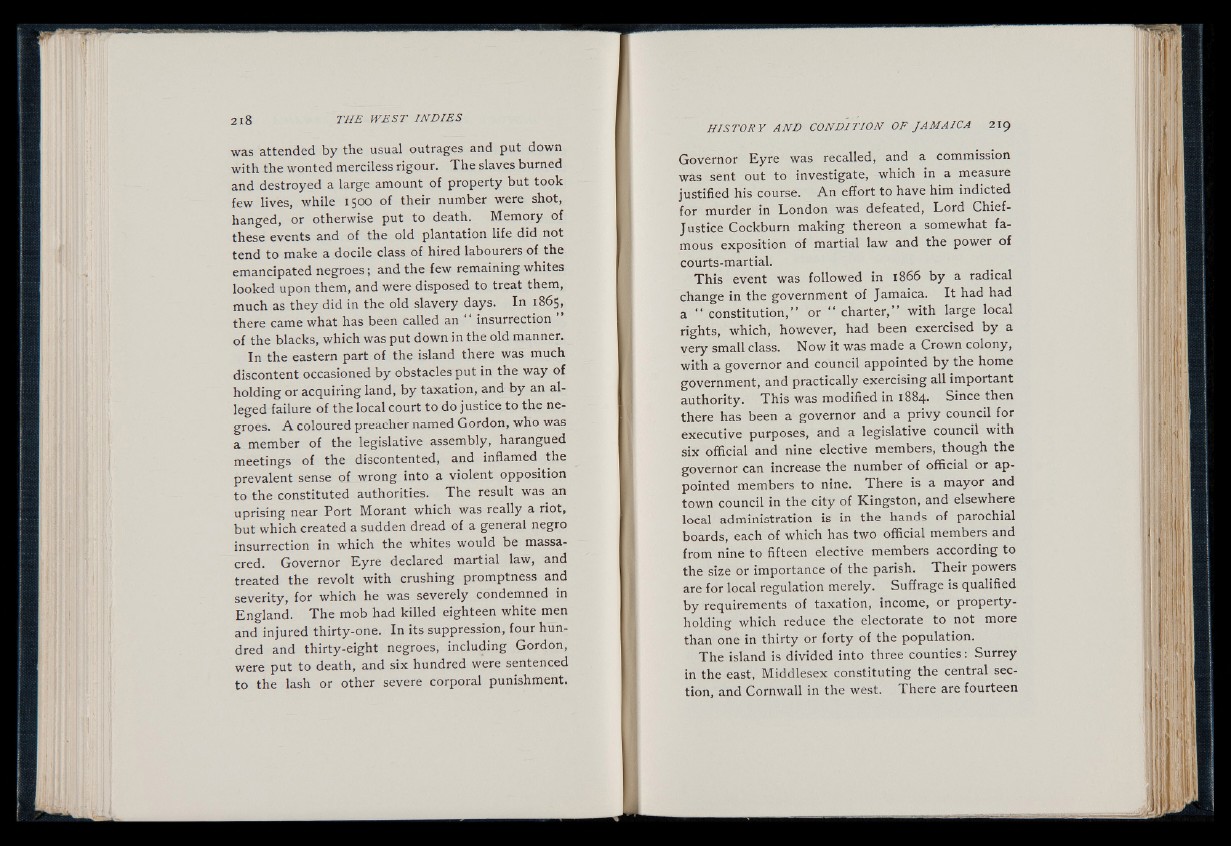
was attended by the usual outrages and put down
with the wonted merciless rigour. T he slaves burned
and destroyed a large amount of property but took
few lives, while 1500 of their number were shot,
hanged, or otherwise put to death. Memory of
these events and of the old plantation life did not
tend to make a docile class of hired labourers of the
emancipated negroes; and the few remaining whites
looked upon them, and were disposed to treat them,
much as they did in the old slavery days. In 1865,
there came what has been called an insurrection
of the blacks, which was put down in the old manner.
In the eastern part of the island there was much
discontent occasioned by obstacles put in the way of
holding or acquiring land, by taxation, and by an alleged
failure of the local court to do justice to the negroes.
A coloured preacher named Gordon, who was
a member of the legislative assembly, harangued
meetings of the discontented, and inflamed the
prevalent sense of wrong into a violent opposition
to the constituted authorities. The result was an
uprising near Port Morant which was really a riot,
but which created a sudden dread of a general negro
insurrection in which the whites would be massacred.
Governor Eyre declared martial law, and
treated the revolt with crushing promptness and
severity, for which he was severely condemned in
England. The mob had killed eighteen white men
and injured thirty-one. In its suppression, four hundred
and thirty-eight negroes, including Gordon,
were put to death, and six hundred were sentenced
to the lash or other severe corporal punishment.
Governor Eyre was recalled, and a commission
was sent out to investigate, which in a measure
justified his course. A n effort to have him indicted
for murder in London was defeated, Lord Chief-
Justice Cockburn making thereon a somewhat famous
exposition of martial law and the power of
courts-martial.
This event was followed in 1866 b y a radical
change in the government of Jamaica. It had had
a “ constitution,” or ” charter,” with large local
rights, which, however, had been exercised by a
very small class. Now it was made a Crown colony,
with a governor and council appointed by the home
government, and practically exercising all important
authority. This was modified in 1884. Since then
there has been a governor and a privy council for
executive purposes, and a legislative council with
six official and nine elective members, though the
governor can increase the number of official or appointed
members to nine. There is a mayor and
town council in the city of Kingston, and elsewhere
local administration is in the hands of parochial
boards, each of which has two official members and
from nine to fifteen elective members according to
the size or importance of the parish. Their powers
are for local regulation merely. Suffrage is qualified
by requirements of taxation, income, or property-
holding which reduce the electorate to not more
than one in thirty or forty of the population.
The island is divided into three counties: Surrey
in the east, Middlesex constituting the central section,
and Cornwall in the west. There are fourteen